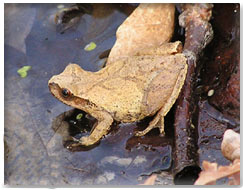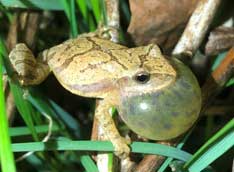 Description
Description
¾ - 1 3/8” (1.9-3.5cm). Dark ‘X’ on back. Light tan to dark brown. Belly white, sometimes with dark flecks. Narrow bar or dark spot between eyes. Large toe pads with a little webbing between toes.
Call Description
Peep-peep-peep-peep”. High pitched, short notes that last about one second and are repeated every second, sometimes with a short trill. A large chorus of peepers can be so loud its almost deafening and may sound like the jingle of sleigh bells.
Indiana Range
Statewide.
Diet
Spiders, ants, and beetles, but will also eat mites, ticks, small caterpillars, and small snails.
Habitat
Wooded areas that are in or near permanent or temporarily flooded areas such as swamps, ponds, lakes, and bogs.
Breeding Habitat 
Fishless temporary wetlands that are near or in wooded areas, including shallow ponds, flooded fields, swamps, and flooded ditches.
Breeding Season
Early March to May. Males will sometimes call during the summer and have been heard in winter.
Eggs
Eggs are laid singly or in clusters of 2-3, attached to vegetation. A single female can deposit 800-1,000 eggs. Hatch within 3-15 days.
Tadpoles
First few weeks spent in leaf litter on bottom of pond. Very small, olive brown to dark green with metallic gold flecks. Belly cream and iridescent. Edges of tail fins blotched or mottled with purplish black.

